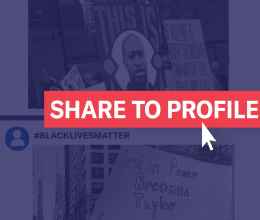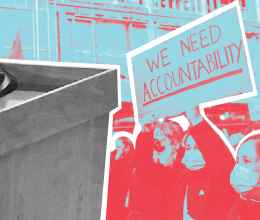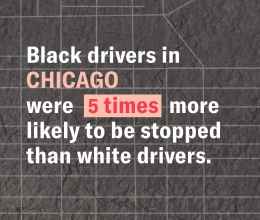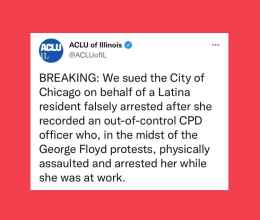A full decade after Illinois mandated that all law enforcement agencies in the state collect and record data about every traffic stop as a means of curbing racial profiling, a study today pointed to continuing signs of troubling racial bias in so-called consent searches by police. The findings, released by the American Civil Liberties Union of Illinois, are drawn from data from the Illinois Department of Transportation, reflecting reporting from Illinois law enforcement agencies during 2013 under the Illinois Traffic Stop Statistical Study Act.
The data reveals, as an example, that statewide across Illinois, African American and Latino drivers are nearly twice as likely as white drivers to be asked during a routine traffic stop for "consent" to have their car searched. Yet white motorists are 49% more likely than African American motorists to have contraband discovered during a consent search by law enforcement, and 56% more likely when compared to Latinos.
The Illinois Traffic Stop Statistical Study Act was first adopted by the General Assembly in 2003, under the sponsorship of then-State Senator Barack Obama. As President, Mr. Obama has pointed proudly to this legislative accomplishment, noting the critical role this data can play in curbing and preventing the scourge of racial profiling. Earlier this year, Governor Pat Quinn signed legislation to extend the collection of data through 2019.
"The 2013 data continues to paint a picture that is troubling and must be addressed," said Adam Schwartz, senior legal counsel for the American Civil Liberties Union of Illinois. "Once a stop occurs, drivers of color are more likely to be asked for permission to search their car -- even though the statistics show that police are far more likely to find contraband in the automobile of a white motorist."
"We see that these troubling signs of racial bias have persisted for a decade in many of our larger police agencies without any response -- that has to end," added Schwartz.
A consent search occurs when a police officer asks a motorist for permission to search their car, after a routine stop, even if there is no visible evidence to justify the search. In 2013, the Illinois State Police conducted more than 2,100 consent searches, nearly 10% of all such searches in Illinois. A Latino motorist was nearly 2.5 times more likely than a white motorist to be asked for permission to search his/her car during a stop by an ISP trooper. Yet, a white motorist asked for consent was nearly 2.5 times more likely than a Latino motorist to have contraband.
Since the setting of the request for consent is often coercive (taking place alongside a road with an armed law enforcement official), most drivers consent to be searched. A leading law enforcement analysis group, the Police Executive Research Forum, explains that a disparity in consent search "hit rates" for different ethnic groups -- like those produced by ISP troopers and other police officers across the state -- show that "a lower standard of proof was applied to searches of minorities than to searches of Caucasians."
A number of local police agencies with unusually high numbers of consent searches had especially troubling disparities in consent search data:
- Chicago -- The Chicago Police Department, which conducted nearly 1,400 consent searches, was more than four times more likely to seek consent to search vehicles driven by African Americans or Latinos (4.74 times more likely for African Americans and 4.09 times more likely for Latinos). Once those searches were completed, white motorists were far more likely to have contraband -- 2.1 times more likely compared to African American motorists and 1.86 times more likely compared to Latinos.
- Aurora -- In Illinois’ second largest city, located 50 miles west of Chicago, African American and Latino motorists were far more likely to be asked for consent to search their vehicle – 2.36 times and 1.63 times more, respectively. Yet white motorists who were consent searched were far more likely to have contraband than African Americans (30% more) and Latinos (46% more).
- Springfield -- In the Capitol City, African American motorists were 3.4 more likely than white motorists to be consent searched, and white motorists were 89% more likely than African American to have contraband discovered during a consent search.
- Rockford -- In Illinois’ third largest city, located in Northwest Illinois, African American motorists were 69% more likely than white drivers to be asked for consent to search their cars, even though white motorists were 67% more likely than African American motorists to be found with contraband during such a search.
"This is a statewide problem, with troubling patterns emerging from nearly every corner of the State," said the ACLU's Schwartz. "Behind these numbers is a far more troubling reality -- each year in Illinois, thousands of completely innocent motorists of color are subjected to humiliating, frightening, time-consuming consent searches that are not necessary or productive in terms of using law enforcement resources."
The ACLU of Illinois today repeated their call that the Illinois General Assembly ban the practice of consent searches statewide.
The ACLU report also notes that there is a troubling racial disparity in the use of drug-sniffing dogs by police in the State. The Illinois State Police, for example, was more than twice as likely to conduct a dog sniff on a stopped automobile driven by a Latino motorist compared to a white motorist. Yet, white motorists were 64% more likely than Latino motorists to be found with contraband in a trooper search that followed a dog alert. Moreover, the data shows that 50% of all searches conducted by the ISP in response to the alert of a dog yielded no contraband. In short, the dogs are wrong as often as they are right.
"This data shows that the use of drug-sniffing dogs needs to be limited and better regulated," added Schwartz.



